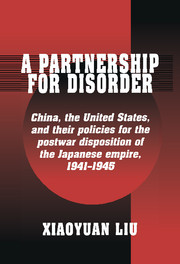 A Partnership for Disorder
A Partnership for Disorder Book contents
- Frontmatter
- Contents
- Acknowledgments
- Note on romanization
- Abbreviations
- Introduction
- 1 The making of an alliance
- 2 The issue of postwar Japan
- 3 China's lost territories
- 4 Korea's independence
- 5 The road to Cairo
- 6 A divisive summit
- 7 Yan'an and postwar East Asia
- 8 Diplomacy without action
- 9 Erosion of a partnership
- 10 The Manchurian triangle
- 11 Bargaining at Moscow
- 12 Epilogue: The crisis of peace
- Appendix I Guiding Plan for Helping the Korean Restoration Movement
- Appendix II Two Chinese documents of the Cairo Conference
- Bibliography
- Index
9 - Erosion of a partnership
Published online by Cambridge University Press: 20 October 2009
- Frontmatter
- Contents
- Acknowledgments
- Note on romanization
- Abbreviations
- Introduction
- 1 The making of an alliance
- 2 The issue of postwar Japan
- 3 China's lost territories
- 4 Korea's independence
- 5 The road to Cairo
- 6 A divisive summit
- 7 Yan'an and postwar East Asia
- 8 Diplomacy without action
- 9 Erosion of a partnership
- 10 The Manchurian triangle
- 11 Bargaining at Moscow
- 12 Epilogue: The crisis of peace
- Appendix I Guiding Plan for Helping the Korean Restoration Movement
- Appendix II Two Chinese documents of the Cairo Conference
- Bibliography
- Index
Summary
In early January 1944, having returned from his summit meetings with Chiang Kai-shek and Joseph Stalin, President Roosevelt reported to the Pacific War Council with his usual optimistic tone, defining the meetings as “highly satisfactory”. Alleging that he had reached agreements with the Chinese and Russians on all the major issues regarding postwar settlement in East Asia, Roosevelt's true enthusiasm concerned his first meeting with Stalin. In retrospect, Roosevelt's separate meetings with Chiang and Stalin in late 1943 were two different points of departure. Afterward, American–Soviet cooperation continued to gain momentum in the direction set at Teheran, but the American–Chinese partnership experienced an anticlimax despite or partially because of the Cairo Conference. These two trends were typically reflected in Roosevelt's conduct of his last summit at Yalta in February 1945. On that occasion, he reached a secret understanding with Stalin over Asian problems without consulting and notifying the Chinese. In fact, in the last two years of the war, when the American government contemplated its postwar Asian policies in more concrete terms, there were serious questions about China's value as an ally in both war and peace.
The Chinese ally reevaluated
In 1944, there were two schools of thought among the China hands of the State Department, neither completely endorsing America's China policy as it stood. One group supported the wartime departure of the American government from its traditional China policy but was concerned about the discrepancy between the reality of China and Washington's inflated wartime definition of that country.
- Type
- Chapter
- Information
- A Partnership for DisorderChina, the United States, and their Policies for the Postwar Disposition of the Japanese Empire, 1941–1945, pp. 202 - 230Publisher: Cambridge University PressPrint publication year: 1996


